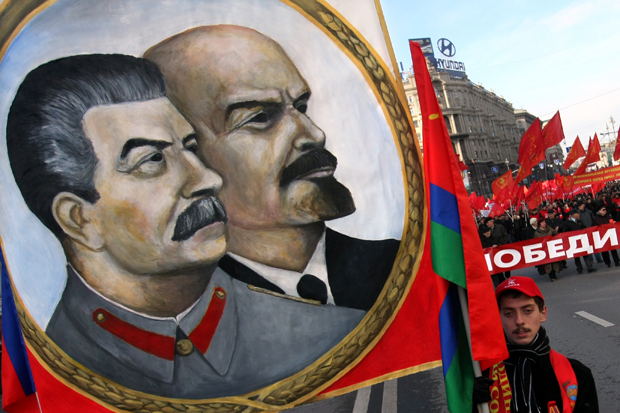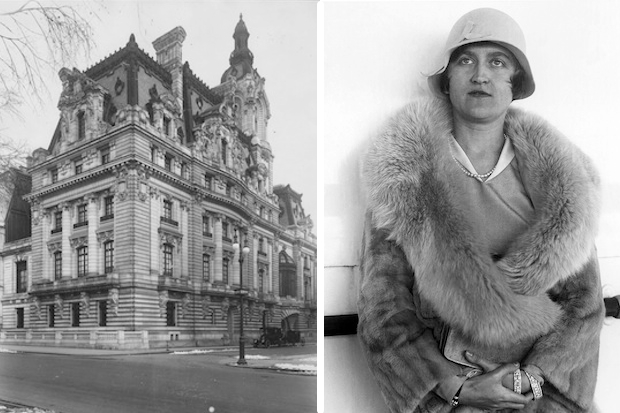‘No, we must go our own way,’ said Lenin. The whole world knows him as Vladimir, while he was in fact Nikolai. ‘Nikolai Lenin’ was the party alias of Vladimir Ilyich Ulianov, a terrorist leader and psychopath whose ideas changed the history of the greater part of the 20th century. This era ended on 26 December 1991 with the collapse of the 74-year-old Soviet Union, founded by Lenin, who seven years after the Bolshevik revolution died of syphilis, only to be succeeded by Stalin.
‘Stalin’ was also an alias. The Soviet dictator’s real name was Ioseb Vissarionovich Jugashvili, born into the family of a Georgian cobbler. His education, which he never finished, was limited to a theological seminary. Those were two leaders who successfully stood their ground against such personalities as David Lloyd George, Winston Churchill, Stanley Baldwin and Clement Attlee.
Extraordinary political decisions and secret intelligence wars fought between Russia and Britain between the two world wars comprise the general subject matter of Victor Madeira’s excellent Britannia and the Bear, published in the ‘History of British Intelligence’ series with a foreword by Christopher Andrew. The book covers the period between 1917 and 1929 — that is, from the Bolshevik revolution masterminded by Lenin to the five years following his demise, when Stalin established himself as the unchallenged master of the country. And for all those decades from Lenin and Stalin to the three-time Russian president Vladimir Putin, the largest country in the world has continued to be unpredictable, as the recent events in Ukraine show.
Madeira’s pioneering work, which in the words of Professor Andrew is ‘the first to integrate successfully the early history of British counter-subversion with the development of the British intelligence services’, will certainly be of interest to students and historians of intelligence. But it should also appeal to anyone interested in modern politics, international relations and, as strange as it may sound, in Russia’s present-day secret intelligence operations in Britain.
Remarkably, as the book clearly demonstrates, there are crucial differences which make Britain during the first decades of the 21st century less capable of handling the Russian threat than 100 years ago. Why is this? According to Madeira, who completed his doctorate in modern international history at Cambridge:
At that time [the period covered in Britannia and the Bear] and despite competition from rival states, Britain was still a manufacturing powerhouse of repute, giving its politicians and senior officials great influence in world affairs. Nowadays, despite globalisation and the information revolution — or perhaps, because of them — most British politicians and senior officials paradoxically seem more insular and self-interested than their counterparts were a century ago. Few have spent significant time living, working or managing — let along fighting —overseas, and fewer still have done military service. The role of the Commonwealth after the end of empire has also declined sharply, as has the public-service ethos in the broader society from which most politicians and officials now come. These days, the average politician or civil servant is worse equipped to cope with or understand the modern Russian state threat, and therefore less able to protect Britain. In politics, the term ‘statesman’ has lost virtually all meaning.
One key finding of Madeira’s research is the extent of Moscow’s access to sensitive information on British security and intelligence operations and personnel, as well as policy decisions. A massive attack on British institutions (the Foreign Office, Scotland Yard, intelligence and security services, political parties, military production facilities, armed forces and the media) started after the Bolsheviks under Lenin and Trotsky recognised that the British empire was the main adversary of the young Soviet state.
This idea has never been abandoned. Unbeknownst to most intelligence historians, Clement Attlee, the leader of the post-second world war Labour government, at his own request had more one-on-one meetings with the director general of MI5 than any other 20th-century British prime minister. As late as 1961, Hugh Gaitskell, Attlee’s successor as Labour leader, in agreement with his close political associates within the shadow cabinet, gave MI5 a list of Labour MPs who, they believed, were either crypto-communists or acted under Communist party instructions. At the time, MI5 decided not to investigate any of the named MPs.
It seems that six decades later, the security service finally learned its lesson, and in an unprecedented move demanded the deportation of Katia Zatuliveter, a Russian researcher who worked for the Liberal Democrat MP Mike Hancock. Zatuliveter was allegedly ‘directed’ by Russian espionage agencies to have affairs with Hancock and a senior Nato official in order to collect intelligence. However, an immigration appeals commission dismissed all accusations and granted her the right to stay in the UK. Soon, the young blonde quietly left for Moscow.
Five years earlier, in November 2006, the combined efforts of MI5, SO15 and the Special Branch failed to properly identify and arrest the murderer of Alexander Litvinenko (a case only now being investigated) as well as to detect Anna Chapman, then on a test mission in London. Shortly following Zatuliveter’s departure came the mysterious deaths of Alexander Perepilichny and, several months later, Boris Berezovsky — both in the UK.
These days we still observe the distinct unwillingness of many politicians and officials to face realities. The brilliant conclusion drawn by Madeira is that the Bolsheviks as well as the Soviet and post-Soviet Russian leaders have always been convinced that ‘at the expense of nearly all else — including many principles supposedly under-pinning its democratic traditions — the West’s primary motive was expectation of profit’. Russia has always cleverly exploited this weakness, and as a rule to her great advantage. Under Putin and Medvedev today, Madeira observes, Russia does simply what it did under Lenin and Stalin. ‘Then, as now, it looked to seduce the West by buying its compliance. Now, as then, the West fails to recognise this and learn lessons at its own peril,’ he writes. Unfortunately, not too many bright young people in this country can think so clearly.
Got something to add? Join the discussion and comment below.
Get 10 issues for just $10
Subscribe to The Spectator Australia today for the next 10 magazine issues, plus full online access, for just $10.
Available from the Spectator Bookshop, £51, Tel: 08430 600033. Boris Volodarsky is the author of Stalin’s Agent: The Life and Death of Alexander Orlov.
You might disagree with half of it, but you’ll enjoy reading all of it. Try your first month for free, then just $2 a week for the remainder of your first year.














Comments
Don't miss out
Join the conversation with other Spectator Australia readers. Subscribe to leave a comment.
SUBSCRIBEAlready a subscriber? Log in